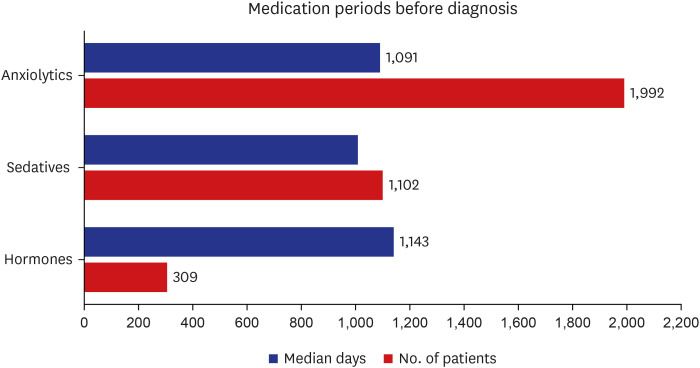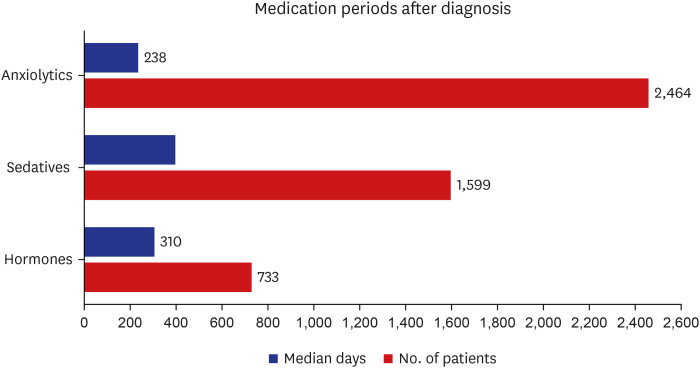J Korean Med Sci.
2023 Dec;38(50):e385. 10.3346/jkms.2023.38.e385.
An Analysis of the Demographics and Clinical Characteristics of Transgender and Intersex Populations in Korea: A Retrospective Study Using HIRA Database
- Affiliations
-
- 1Department of Plastic and Reconstructive Surgery, Korea University Anam Hospital, Korea University College of Medicine, Seoul, Korea
- 2Department of Biostatistics, Korea University College of Medicine, Seoul, Korea
- KMID: 2549955
- DOI: http://doi.org/10.3346/jkms.2023.38.e385
Abstract
- Background
Transgender and intersex populations have long remained under-documented in South Korea, largely due to the absence of comprehensive epidemiological data. With increasing societal acknowledgment, there's an urgent need to understand the demographics and health challenges faced by these communities.
Methods
This retrospective, large-scale data study included people who received the F64 codes from the Korean Health Insurance Review & Assessment Service between January 2007 and December 2021. Demographics, gender-affirmative treatments, and psychiatric related medications were examined.
Results
Between 2007 and 2021, 8,602 patients were diagnosed with “gender identity disorder” and 45 with “intersex.” A steadily increasing annual prevalence was observed, peaking at 986 cases in 2021. The majority (79.8%) were aged between 10 and 30. Nearly half (53.2%) exhibited mental and behavioral disorders. Two-thirds had been prescribed anxiolytics or sedatives either before or after diagnosis. Merely 12.1% received hormone therapy covered by health insurance.
Conclusion
This is the first large-scale study highlighting the demographics and clinical characteristics of the transgender and intersex populations in Korea. The study reveals a consistent growth of these communities over the past 15 years, with a significant proportion under 30 years of age facing mental and behavioral challenges. Findings underscore the need for targeted healthcare interventions, early psychological support, and comprehensive insurance coverage tailored to the specific needs of these individuals in Korea.
Figure
Reference
-
1. Lee H, Park J, Choi B, Yi H, Kim SS. Experiences of and barriers to transition-related healthcare among Korean transgender adults: focus on gender identity disorder diagnosis, hormone therapy, and sex reassignment surgery. Epidemiol Health. 2018; 40:e2018005. PMID: 29514430.2. Bauer GR, Hammond R, Travers R, Kaay M, Hohenadel KM, Boyce M. “I don’t think this is theoretical; this is our lives”: how erasure impacts health care for transgender people. J Assoc Nurses AIDS Care. 2009; 20(5):348–361. PMID: 19732694.3. Hughes JP, Emel L, Hanscom B, Zangeneh S. Design issues in transgender studies. J Acquir Immune Defic Syndr. 2016; 72 Suppl 3(Suppl 3):S248–S251. PMID: 27429191.4. Feng Y, Lou C, Gao E, Tu X, Cheng Y, Emerson MR, et al. Adolescents’ and young adults’ perception of homosexuality and related factors in three Asian cities. J Adolesc Health. 2012; 50(3):Suppl. S52–S60. PMID: 22340857.5. Lee H, Operario D, van den Berg JJ, Yi H, Choo S, Kim SS. Health disparities among transgender adults in South Korea. Asia Pac J Public Health. 2020; 32(2-3):103–110. PMID: 32238067.6. Yi H, Lee H, Park J, Choi B, Kim SS. Health disparities between lesbian, gay, and bisexual adults and the general population in South Korea: rainbow connection project I. Epidemiol Health. 2017; 39:e2017046. PMID: 29056030.7. Lee H, Tomita KK, Habarth JM, Operario D, Yi H, Choo S, et al. Internalized transphobia and mental health among transgender adults: a nationwide cross-sectional survey in South Korea. Int J Transgend Health. 2020; 21(2):182–193. PMID: 33015668.8. Flores AR, Herman J, Gates GJ, Brown TN. How Many Adults Identify as Transgender in the United States? Vol. 13. Los Angeles, CA, USA: Williams Institute;2016.9. McFarland W, Wilson E, Fisher Raymond H. How many transgender men are there in San Francisco? J Urban Health. 2018; 95(1):129–133. PMID: 28462471.10. Conron KJ, Scott G, Stowell GS, Landers SJ. Transgender health in Massachusetts: results from a household probability sample of adults. Am J Public Health. 2012; 102(1):118–122. PMID: 22095354.11. Lee DY, Kim SH, Woo SY, Yoon BK, Choi D. Associations of health-risk behaviors and health cognition with sexual orientation among adolescents in school: analysis of pooled data from Korean nationwide survey from 2008 to 2012. Medicine (Baltimore). 2016; 95(21):e3746. PMID: 27227939.12. Phillips J, Yi J. Queer communities and activism in South Korea: periphery-center currents. J Homosex. 2020; 67(14):1948–1973. PMID: 31135329.13. Oh JW, Yun Y, Lee ES. A review of gender-affirming hormone therapy for transgender and gender diverse adults in South Korea. J Menopausal Med. 2022; 28(3):92–102. PMID: 36647272.14. Koch JM, McLachlan CT, Victor CJ, Westcott J, Yager C. The cost of being transgender: where socio-economic status, global health care systems, and gender identity intersect. Psychol Sex. 2020; 11(1-2):103–119.15. Snow A, Cerel J, Loeffler DN, Flaherty C. Barriers to mental health care for transgender and gender-nonconforming adults: a systematic literature review. Health Soc Work. 2019; 44(3):149–155. PMID: 31359065.16. McCann E, Sharek D. Mental health needs of people who identify as transgender: a review of the literature. Arch Psychiatr Nurs. 2016; 30(2):280–285. PMID: 26992883.17. Lim HH, Jang YH, Choi GY, Lee JJ, Lee ES. Gender affirmative care of transgender people: a single center’s experience in Korea. Obstet Gynecol Sci. 2019; 62(1):46–55. PMID: 30671393.18. Hyde Z, Doherty M, Matt Tilley PM, McCaul KA, Rooney R, Jancey J. The First Australian National Trans Mental Health Study: Summary of Results. Perth, Australia: Curtin University of Technology, School of Public Health;2014.19. Hanna B, Desai R, Parekh T, Guirguis E, Kumar G, Sachdeva R. Psychiatric disorders in the U.S. transgender population. Ann Epidemiol. 2019; 39:1–7.e1. PMID: 31679894.20. Carmel TC, Erickson-Schroth L. Mental health and the transgender population. J Psychosoc Nurs Ment Health Serv. 2016; 54(12):44–48.21. Bouman WP, Claes L, Brewin N, Crawford JR, Millet N, Fernandez-Aranda F, et al. Transgender and anxiety: a comparative study between transgender people and the general population. Int J Transgenderism. 2017; 18(1):16–26.
- Full Text Links
- Actions
-
Cited
- CITED
-
- Close
- Share
- Similar articles
-
- Health Care for Transwoman (Male to Female)
- Gender affirmative care of transgender people: a single center's experience in Korea
- Transgender youth: current concepts
- A qualitative study on the internal response of medical students during the transgender healthcare education: a focus on professional identity
- A Study of Intersex



